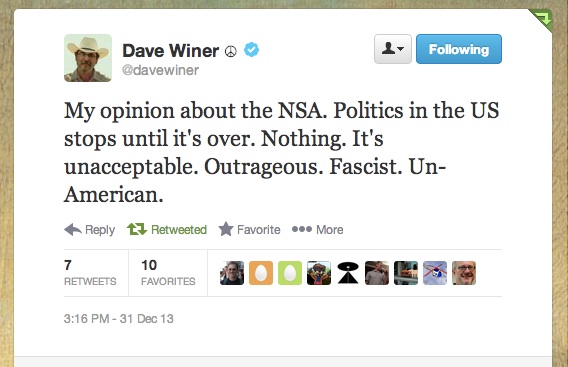After a while, one of the aides led me to the front cabin to talk with the President some more. The week before, Obama had given out the annual Presidential Medals of Freedom. One went to Benjamin C. Bradlee, the editor who built the Washington Post by joining the Times in publishing the Pentagon Papers, in 1971, and who stood behind Bob Woodward and Carl Bernstein as they began publishing the Watergate exposés that led to the fall of the Nixon Presidency. I asked Obama how he could reconcile such an award with his Administration’s aggressive leak investigations, which have ensnared journalists and sources, and its hostility to Edward Snowden’s exposure of the N.S.A.’s blanket surveillance of American and foreign communications.
After a long pause, Obama began to speak of how his first awareness of politics came when, as an eleven-year-old, he went on a cross-country bus trip with his mother and grandmother and, at the end of each day, watched the Watergate hearings on television. “I remember being fascinated by these figures and what was at stake, and the notion that even the President of the United States isn’t above the law,” he said. “And Sam Ervin with his eyebrows, and Inouye, this guy from Hawaii—it left a powerful impression on me. And so, as I got older, when I saw ‘All the President’s Men,’ that was the iconic vision of journalism telling truth to power, and making sure our democracy worked. And I still believe that. And so a lot of the tensions that have existed between my White House and the press are inherent in the institution. The press always wants more, and every White House, including ours, is trying to make sure that the things that we care most about are what’s being reported on, and that we’re not on any given day chasing after fifteen story lines.”
Then Obama insisted that what Snowden did was “not akin to Watergate or some scandal in which there were coverups involved.” The leaks, he said, had “put people at risk” but revealed nothing illegal. And though the leaks raised “legitimate policy questions” about N.S.A. operations, “the issue then is: Is the only way to do that by giving some twenty-nine-year-old free rein to basically dump a mountain of information, much of which is definitely legal, definitely necessary for national security, and should properly be classified?” In Obama’s view, “the benefit of the debate he generated was not worth the damage done, because there was another way of doing it.” Once again, it was the President as Professor-in-Chief, assessing all sides, and observing the tilt of the scales. (The day before his speech last week on reforming the N.S.A., he told me, “I do not have a yes/no answer on clemency for Edward Snowden. This is an active case, where charges have been brought.”)
The coverage of the leaks, Obama complained, paints “a picture of a rogue agency out there running around and breaking a whole bunch of laws and engaging in a ‘domestic spying program’ that isn’t accurate. But what that does is it synchs up with a public imagination that sees Big Brother looming everywhere.” The greater damage, in his view, was the way the leaks heightened suspicions among foreign leaders. Obama enjoyed a good relationship with Angela Merkel, but he admitted that it was undermined by reports alleging that the U.S. tapped her cell phone. This, he said, felt “like a breach of trust and I can’t argue with her being aggravated about that.”
[…]
Obama admitted that the N.S.A. has had “too much leeway to do whatever it wanted or could.” But he didn’t feel “any ambivalence” about the decisions he has made. “I actually feel confident that the way the N.S.A. operates does not threaten the privacy and constitutional rights of Americans and that the laws that are in place are sound, and, because we’ve got three branches of government involved and a culture that has internalized that domestic spying is against the law, it actually works pretty well,” he said. “Over all, five years from now, when I’m a private citizen, I’m going to feel pretty confident that my government is not spying on me.”
So that’s all right then. Steady as we go.

